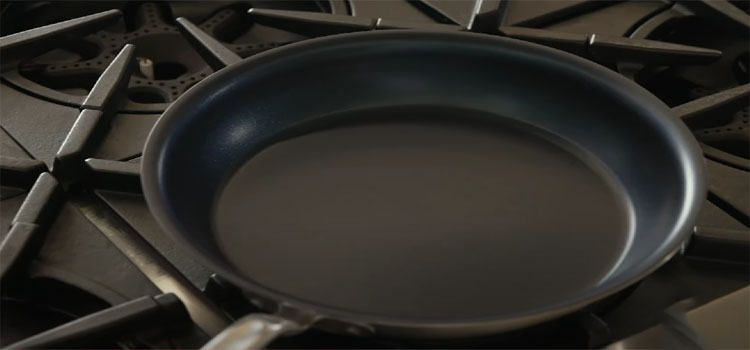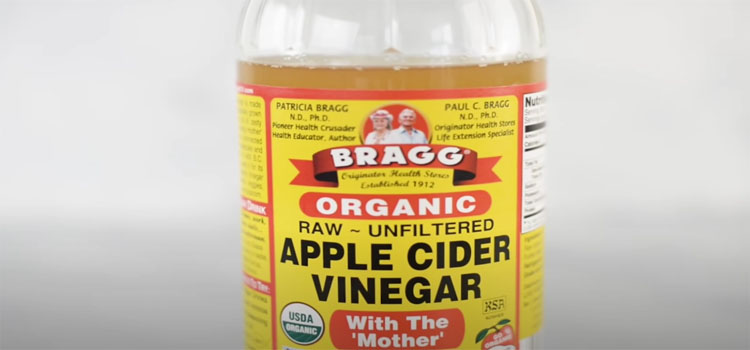Last Updated on September 15, 2024 by Shari Mason
For as long as I can recall, non-stick pans **saved the day** in my kitchen, making cooking a joy and cleanup a snap.
Over the years, I have come across the common belief that using vinegar on non-stick pans can be detrimental to their coating.
As someone who values the longevity of my cookware, I was intrigued to investigate this claim and determine the truth behind it.
So does vinegar ruin non-stick pans? Let’s find out.
Can Vinegar Ruin Non-Stick Pans?


While vinegar [1] is acidic and can potentially react with the non-stick coating on the pan, many experts believe that the small amount of vinegar used in cooking or cleaning is not enough to cause significant damage.
Some non-stick pan manufacturers even recommend using vinegar as a cleaning agent.
However, it’s important to avoid harsh or abrasive cleaners that can scratch the non-stick coating and reduce its effectiveness.
“Cleaning is my favorite way to relax. I clear things out and get rid of the stuff I don’t need. When the food pantry and the refrigerator are organized, I feel less stressed.”
Jennifer Morrison, American Actress
Additionally, it’s always a good idea to follow the manufacturer’s instructions for use and care to ensure your non-stick pan lasts as long as possible.
How Should Non-Stick Pans Be Cleaned?
Non-stick pans should be cleaned with care to avoid damaging the non-stick coating. Harsh or abrasive cleaners and metal utensils should be avoided as they can scratch or damage the non-stick coating.
Instead, use a soft sponge or cloth with mild soap and warm water to gently clean the pan after each use. If food is stuck to the pan, soak it in warm, soapy water to loosen it before cleaning.
Also, avoid using cooking sprays or oils not explicitly designed for non-stick pans, as they can damage the coating.
How To Use Vinegar On Non-Stick Pans


- Dilute vinegar with water: To reduce the acidic nature of vinegar, mix one part vinegar with two parts water. This will make it safe to use on non-stick pans.
- Use a soft sponge or cloth: Avoid using abrasive materials to clean your non-stick pan. Instead, gently clean the pan with a soft sponge or cloth with the diluted vinegar solution.
- Rinse thoroughly: After cleaning your non-stick pan with vinegar, rinse it thoroughly with water to remove any remaining vinegar.
- Use vinegar for tough stains: Vinegar can effectively remove tough stains or odors from non-stick pans. Soak the pan in the diluted vinegar solution for a few hours before cleaning it with a soft sponge or cloth.
What Should Be Avoided When Cleaning Non-Stick Pans?
- Abrasive cleaners: Avoid using abrasive cleaners like scouring pads, steel wool, or abrasive powders, as they can scratch the non-stick coating and reduce its effectiveness.
- Harsh chemicals: Avoid harsh chemicals like bleach, ammonia, or oven cleaners, as they can also damage the non-stick coating.
- Metal utensils: Avoid using them on non-stick pans, as they can scratch or damage the non-stick coating. Instead, use utensils made of silicone, plastic, or wood.
- Cooking sprays: Avoid using cooking sprays containing lecithin or other additives not explicitly designed for use with non-stick pans. These additives can build up on the non-stick coating and reduce its effectiveness.
- Baking soda: While baking soda [2] is an effective cleaner for many surfaces, it should be avoided on non-stick pans as it can scratch or damage the coating.
How Long Do Non-Stick Pans Typically Last?
The lifespan of non-stick pans can vary depending on factors such as the quality of the pan, frequency of use, and how well it is cared for.
A high-quality non-stick pan can last several years with proper care and use. However, if the pan is not cared for properly, the non-stick coating can deteriorate quickly and reduce the pan’s lifespan.
“In the kitchen, where every ingredient has its purpose, vinegar may be a multi-purpose hero.”
Eat Pallet Restaurant & Food Advice
It’s essential to follow the manufacturer’s instructions for use and care, avoid using harsh or abrasive cleaners, and use utensils made of non-scratch materials to help extend the lifespan of your non-stick pan.
FAQs
u003cstrongu003eHow do you know if your non-stick pan is ruined?u003c/strongu003e
You can tell if your non-stick pan is ruined if the non-stick coating is visibly scratched, flaking off, or missing in certain areas. Additionally, if food is sticking to the pan despite proper use and care, or if the pan is showing signs of rust or corrosion, it may be time to replace the pan.
u003cstrongu003eCan you use salt to clean non-stick pans?u003c/strongu003e
No, you should avoid using salt to clean non-stick pans as it can scratch or damage the non-stick coating. It’s best to use gentle, non-abrasive cleaners and avoid using harsh or abrasive materials that can scratch or damage the coating.
Final Thoughts
Vinegar can damage non-stick pans due to its acidic nature, but there are safe ways to use vinegar on these pans, such as diluting it with water and avoiding harsh or abrasive cleaners.
It’s essential to follow the manufacturer’s instructions for use and care, use gentle, non-abrasive cleaners, and avoid using metal utensils or cooking sprays that can scratch or damage the non-stick coating.
A high-quality non-stick pan can last several years with proper care and attention. Still, it’s essential to periodically inspect the non-stick coating for signs of wear and tear and replace the pan if necessary.
By following these tips, you can enjoy the benefits of non-stick cookware while ensuring it stays in good condition.
References:
- https://www.sciencedirect.com/topics/food-science/vinegar
- https://www.healthline.com/nutrition/baking-soda-benefits-uses
- Can You Put an AC Unit in the Kitchen? - September 27, 2024
- What Cheese Does Olive Garden Use? Discover Their Signature - September 27, 2024
- How to Cancel a Pizza Hut Order? Quick & Easy Guide - September 24, 2024


